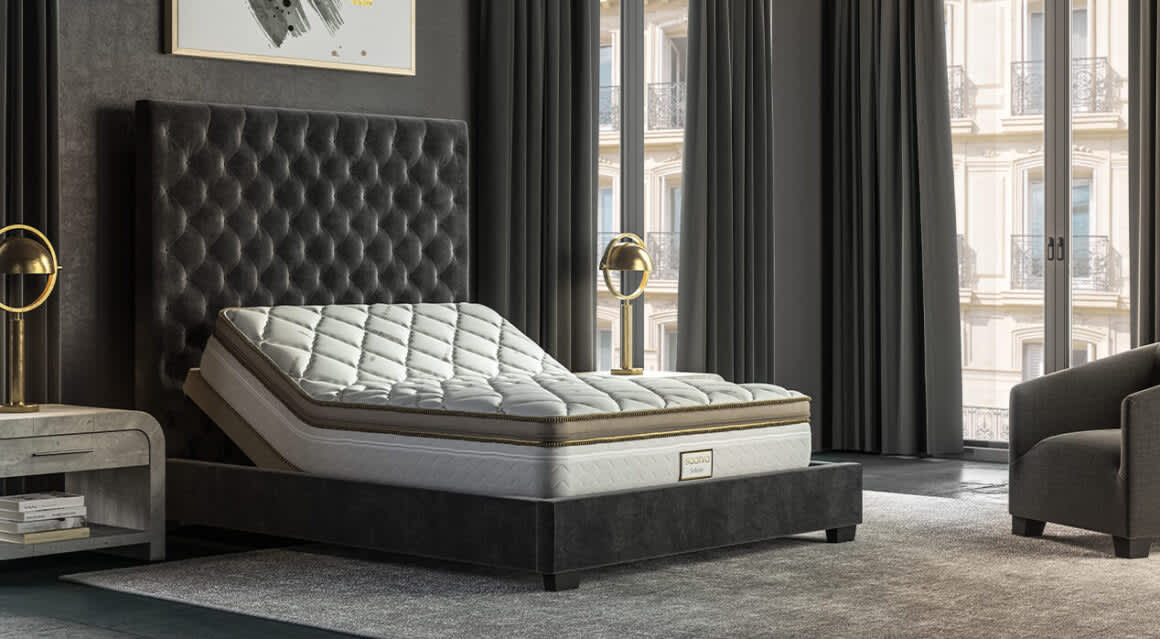On This Page
The Best Mattress for Snoring
Our Top Picks
-
Best Overall Mattress
Solaire -
Most Comfortable Mattress
WinkBeds GravityLux -
Best Mattress for Couples
Nectar Luxe -
Best Mattress for Side Sleepers
Helix Midnight Luxe
Best Overall Mattress

The Solaire from Saatva is an excellent solution for sleepers who need a specific firmness level to help alleviate snoring. The airbed model can be adjusted to 50 different firmnesses, while foam and latex layers give you ample cushioning.
Pros & Cons
Pros
- Fully customizable with 50 firmness levels
- Pairs perfectly with an adjustable base
- Exceeded expectations of side sleepers on our team
Cons
- Price is high for shoppers on a budget
- Heavy design can be awkward to move
Ratings
Our Take
Most Comfortable Mattress

The WinkBeds GravityLux is an all-foam mattress with enhanced support in key areas, which helps keep your body from sinking in too deep. With three firmnesses to choose from, most of our testers found a model that felt comfortable.
Pros & Cons
Pros
- Breathable, eucalyptus-derived Tencel cover
- AirCell memory foam engineered to dispel heat
Cons
- Breathable, eucalyptus-derived Tencel cover
- AirCell memory foam engineered to dispel heat
Ratings
Our Take
Best Mattress for Couples

The Nectar Luxe is an excellent choice for side sleepers who are tired of waking up with sore spots in the shoulders and hips. The adaptive all-foam design conforms closely to your body to reduce painful pressure buildup at night.
Pros & Cons
Pros
- Cooling cover with cooling fibers
- Plush memory foam delivers exceptional pressure relief
- Extra-thick polyfoam core for added stability
Cons
- May feel too soft for stomach sleepers over 130 pounds
- Some hot sleepers may feel too warm
Ratings
Our Take
Best Mattress for Side Sleepers

The Helix Midnight Luxe is a hybrid mattress that hits a sweet spot between support and cushioning for a wide swath of sleepers. Beds with a comfortably balanced design are a must-have for sleepers prone to snoring.
Pros & Cons
Pros
- Foam comfort layers offer excellent cushioning
- Medium firm (6) feel and sturdy coils ensure lower back support for many side and back sleepers
- Two cooling cover options
Cons
- Stomach sleepers over 230 pounds won’t receive enough support
- Foam may emit minor off-gassing odor at first
Ratings
Our Take
Compare Our Top Picks
| Mattress | Mattress Type | Ideal For | Value | Sleep Trial |
| Solaire | Airbed | Couples | Good Value | 365 Nights ($99 Return Fee) |
| WinkBeds GravityLux | Foam | Combination Sleepers | Good Value | 120 nights (30 night requirement) |
| Nectar Luxe | Foam | Side Sleepers | Good Value | 365 nights |
| Helix Midnight Luxe | Hybrid | Combination Sleepers | Good Value | 100 nights (30-night requirement) |
Best Type of Mattress for Snoring
Choosing the right mattress type can help reduce snoring, particularly if your symptoms are caused by allergies, nasal congestion, or are worse when sleeping on your back. A mattress for snoring should support a sleep posture that eases breathing. It should also contain materials that reduce congestion-triggering allergens.
Foam
Foam mattresses cradle the body and relieve pressure, making them ideal for side sleepers and those new to this breathing-friendly position. Deep contouring helps maintain a stable sleeping posture, great for combating snoring. But, foam also has a tendency to retain heat.
Hybrid and Innerspring
These options merge foam or latex comfort layers with a support layer made of coils. Coils add airflow and a bit of bounce to both mattress types, which might appeal to those who move around at night. At the same time, motion transfer and occasional noise from the coils could disturb light sleepers.
Latex
Renowned for their durability, latex mattresses offer a responsive surface that can help maintain spinal alignment. Latex mattresses are also breathable and have naturally hypoallergenic properties, which may help reduce congestion that worsens snoring among people with allergies.
Airbed
Airbeds allow for adjustable firmness, enabling sleepers to find the optimal feel to support side sleeping and minimize snoring. The ability to adjust firmness on each side of the bed can be particularly beneficial for couples with different preferences. However, airbeds can be expensive and difficult to move.
Adjustable Beds
Tailor-made for reducing snoring, adjustable beds let you find the perfect sleeping angle to open your airways. Usually remote-operated, adjustable beds allow you to incline the head and sometimes decline the foot of the bed. These beds offer a combination of comfort and flexibility, with the potential to lessen snoring when paired with a compatible mattress.
How Sleeping Position Affects Snoring
Your choice of sleeping position can heavily influence your snoring. Back sleeping can lead to snoring, as tissues in the mouth and throat fall back and narrow the airways. Side sleeping, on the other hand, is an evidence-based method of reducing snoring. Elevating your head, either with pillows or an adjustable bed, can also reduce snoring by opening the airways.
How to Determine the Right Firmness Level for You
We use a 10-point firmness scale to help match your unique needs to the right mattress. To reduce snoring, the right firmness is one that supports a healthy sleep position and is well suited to your body weight and preferences.
In general, side sleepers and lighter individuals prefer softer mattresses, while back or stomach sleepers and heavier individuals benefit from firmer options.
Additional Tips to Prevent Snoring
Beyond choosing the right mattress, several strategies can further help prevent snoring, enhancing sleep quality for you and your partner.
Change Up Your Sleeping Position
Switching from back to side sleeping can make a noticeable difference in snoring levels. If you’re new to side sleeping, body pillows may help you maintain this position throughout the night, offering a simple approach to reducing snoring.
Find the Right Pillow
A pillow for snoring elevates your head to the ideal angle to help keep your airways open. For side sleepers, a higher loft might be beneficial, while back sleepers might opt for a medium loft. Wedge pillows and other specialized shapes can also prop up the head and encourage a snore-reducing sleeping position.
Try an Anti-Snoring Device
Nasal strips and mouthpieces can sometimes provide quick snoring relief. Nasal strips work by gently opening the nasal passages to improve airflow, while mouthpieces adjust the position of your jaw or tongue to keep the airway open. These devices target the root causes of snoring without the need for medications or surgeries.
Video: How to Stop Snoring
Watch our video as our sleep expert explains what’s happening in your body to make you snore each night, some simple home remedies to help, and when you should likely seek medical advice.
Discover More Mattress Solutions
Check out our other mattress buying guides to find the right mattress for your needs.
More Mattress Options for Specific Needs
Mattress Type
- Best Mattress for Acid Reflux
- Best Mattress for Adjustable Beds
- Best Mattress for Allergies
- Best Mattress for Arthritis
- Best Mattress for Athletes
- Best Mattress for Back Pain
- Best Mattress for Fibromyalgia
- Best Mattress for Hip Pain
- Best Mattress for Guest Rooms
- Best Mattress for Platform Beds
- Best Mattress for Scoliosis
- Best Mattress for Shoulder Pain
- Best Mattress for Sex
How We Test
Our recommendations come from extensive research and hands-on testing, ensuring you get advice you can trust. Given that many of us are ex-snorers, we’ve paid extra attention to how different mattresses can impact snoring. Our diverse team of testers, with their wide range of sleeping styles and body types, spends considerable time with each product. For an in-depth look at our process, visit our methodology page, where we detail our approach to finding the best mattresses.
Frequently Asked Questions
Snoring occurs when airflow is restricted in the throat and nasal passages, causing tissues to vibrate. Snoring can be influenced by various factors, including sleep position, anatomy, and nasal congestion. Addressing these factors can help reduce snoring.
The ideal mattress for snorers is one that supports proper spinal alignment, promotes side sleeping, and doesn’t worsen nasal congestion caused by allergies. Hybrid, latex, and adjustable beds are often recommended for their balance of comfort and support for side sleepers.
The right mattress firmness depends on your body weight and sleep position. That said, we’ve found that a medium firm mattress works well for most snorers. It provides the right mix of softness and support for side sleeping, which can help keep airways open and reduce snoring.
Side sleeping is considered the best position for reducing snoring, as it helps maintain open airways. In contrast, back sleeping is considered the worst position because tissues in the mouth and throat can fall backward and narrow the airway.
Elevating your head can help reduce snoring by improving airflow and keeping your airway from becoming blocked during sleep. Adjustable beds and wedge pillows are effective tools for maintaining this sleeping position.
